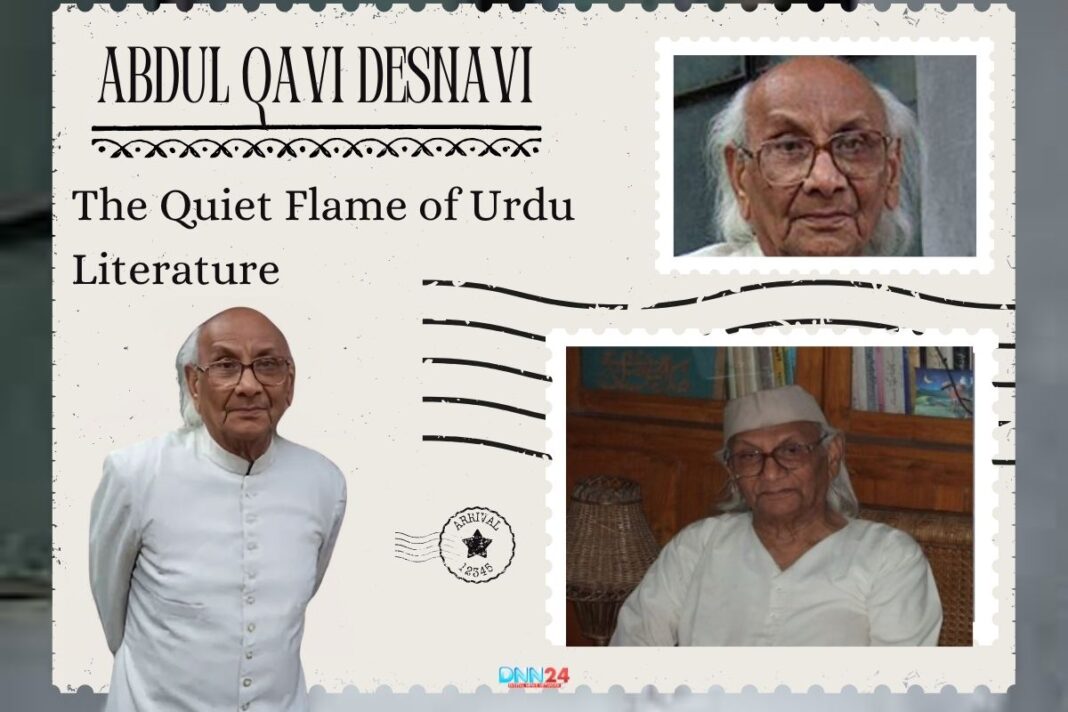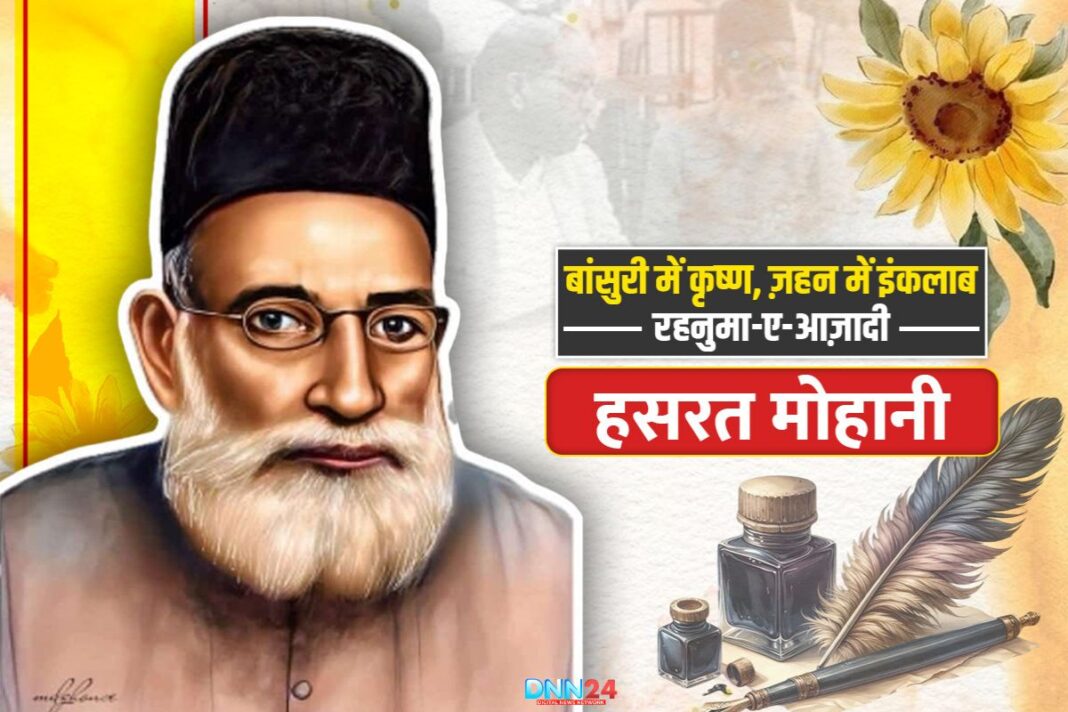It is a crisp morning in November 1930 in Desna, Bihar; a child is born with a lot of promise and is destined to become a luminary of Urdu literature. Abdul Qavi Desnavi’s story begins not in the bustling cities but in the embrace of rural India, where stories are whispered by the wind and dreams are sown in the fields.
His father, the late Syed Mohammed Saeed Raza, was a professor of Urdu, Arabic (retired) and Persian language at St. Xavier College in Mumbai, a man whose words ran in the blood of his son. The family of Desnavi traced its ancestry to Syed Sulaiman Nadvi, the well-known historian and biographer, and this background of academic tradition entered into the composition of the boy.
The surroundings of Desnavi brought a lot of smell of ink and rustling paper in the early times of his days. His two learning brothers shared the home into the temple of thought and discussion. He started at the lanes of Arrah, where he earned his primary education at St. Xavier’s College in the city of Mumbai, where he graduated with flying colours; curiosity and seeking insight into knowledge continued to follow Desnavi. As a child, he listened to the stories that were told by older people with open eyes, swallowing story after story, knowledge after knowledge like pearls.
However, life in Desna was not only about books. Of little Abdul, running across mustard fields, chanting verses to the birds, and writing his earliest verses on the walls of his house with a bit of charcoal–there are unheard, untold stories. One day, when his father found him scribbling poetry as opposed to doing homework, he merely replied with a smile and said, Let the boy have his say in his heart. That heart, to be sure, would talk of millions sometimes.
Abdul Qavi Desnavi from Student to Ustad; the making of a literary giant
Having made his academic successes, Abdul Qavi Desnavi started working as a teacher in 1961 at Saifia Post Graduate College, Bhopal. In this, he was a professor, teacher, friend, and mentor to generations of students. His laugh, stern injunctions, and poetry recitals were to be heard in the halls of Saifia College. He climbed to the position of the head of the Urdu department and made it one of the most reputed ones in the subcontinent. Some of the poets and scholars of today are his disciples, the most famous of whom is the well-known Javed Akhtar.
It was a different world in Desnavi’s classroom. He would start giving lectures with a couplet and let the words of the couplet in the air, and then immersing himself into the depths of Urdu literature. Students recall how he occasionally would be caught in reverie at mid-sentence, as though he still heard the voice of Ghalib or Iqbal. Then, there was an occasion on a rainy afternoon when he took his students to the college garden instead of giving any instruction and recited poetry to the rain amid falling drops. According to him, literature is not something that can be read, but it can be lived.
However, Abdul Qavi Desnavi’s path to success was not easy. In spite of his lofty scholarship, he never aspired to awards or fame. He is hardly ever credited in his lifetime because he silently toiled as an author, churning out more than fifty books and three hundred research articles. His modesty was a legend; when somebody asked him about his successes, he would say, “I am only a servant of Urdu.”
The Writer’s Pen: Works That Shaped Urdu
The role of Abdul Qavi Desnavi in Urdu literature is enormous and various. He wrote about the giants, Maulana Abul Kalam Azad, Mirza Ghalib and Allama Iqbal, and made their lives and words live again in front of new generations. His magnum opus, Hayat-e-Abul Kalam Azad, is a mammoth biography translated into twenty-two languages, proving it to be a cause of universal interest. His other renowned works are Bhopal Aur Ghalib, Talash-e-Azad, Urdu Shairi Ki Gyarah Aawazein and Bachchon Ka Iqbal.
However, Desnavi’s writing was distinctive because he defined the scholar with a feeling. He does not make dull scholarly books: his books breathe, live, and are interwoven with stories, anecdotes, and poetic fancies. He once followed eleven of Ghalib’s students to Bhopal, integrating their stories into the city’s texture. He also went a step further to depict portraits of five well-known people in one city, where places and people define each other in his book Ek Shahar Panch Mashahirs.
Abdul Qavi Desnavi also wrote about children because he thought literature had to be planted early. His Bachchon Ka Iqbal presents Allama Iqbal’s poetry and philosophy in simple, readable words and easy language for young minds. In his work, he served as a conduit between generations, bridging the gap between classics and everyone.
The tales of the research of Desnavi are made legendary–how he has spent nights in dusty libraries after unremembered manuscripts, or how he has located here an unusual Ghalib letter waving his eyes with excitement in a decaying Bhopal haveli. To him, any word once lost was a treasure because it can be found.
The Unheard Stories: Life of Quiet Greatness
Despite his monumental contributions, Abdul Qavi Desnavi remained an unsung hero for much of his life. He never demanded any awards or wanted to be in the spotlight. However, his presence appeared everywhere: in the words of his pupils, the pages of his books, and the atmosphere of the literary circles of Bhopal. The country only learned about his legacy when Google completed an obeisance to him by placing a doodle on his birthday that occurred last July 2011, even after his death.
His house in the Shahjehanabad area of Bhopal used to be full of visitors, including his students, poets, and writers who sought his advice. He would greet them all with a cup of chai and couplet. The one was about the visit of a young poet who had failed in love and was willing to quit poetry. Desnavi listened, then led him to a pen and said, write your pain. Poetry cures you.” That poet turned out to become a renowned writer and never forgot the day Desnavi gave him hope.
In later years, Desnavi also stood as a rock to the Urdu community. He was an honorary lecturer and consultant to universities, and he wrote until his last day, his mind as keen as ever, his heart truly young. When he died on 7 July 2011, the world had lost not only a scholar but a real-word lover.
Abdul Qavi Desnavi : The Heartbeat of Urdu- A Legacy That Lives On
Today, Abdul Qavi Desnavi’s legacy endures in every student who picks up a pen and every reader who loses themselves in the magic of Urdu poetry. His life reminds us that there is no one scale of greatness always because there can be a small scale of greatness, which may be present in the quiet work of a teacher, the subtle inspiration of a mentor, or the silent effort of a writer who believes in the power of words.
The story of Desnavi is not only the story of a literary giant; it is the story of a man who used to live with humility, love, and passion for his language and culture. His story—from life in fields and courts to becoming a loved ustad—speaks of dreams, hard work, and the written word.
Let us remember Abdul Qavi Desnavi not just as a name in textbooks but as a living spirit whose words continue to inspire, heal, and unite. He had written, as it were, in his day, What the heart of the boy sayeth. And indeed, his heart still speaks through his books, his students, and his stories.
Also Read: Ale Ahmad Suroor: The Poet Who Breathed Life Into Words
You can connect with DNN24 on Facebook, Twitter, and Instagram and subscribe to our YouTube channel.




Dear Mr. Deepak Kumar,
I wanted to take a moment to express my sincere appreciation on your skillfully written article on Late Abdul Qavi Desnavi.
Your article resonated well within our family and late Desnavi’s admirers.
I found your article refreshing and insightful.
The finesse and sophistication of words in your article are highly valued by us.
Regards,
Ali Naqi Desnavi
Dear Mr. Ali Naqi Desnavi,
Thank you very much for your kind and thoughtful words regarding my article on the late Abdul Qavi Desnavi. It is genuinely heartening to know that my work resonated with your family and admirers of the esteemed Desnavi sahab.
I am delighted you like it. Writing about such a great literary figure was an honor and a responsibility, and I am happy that I made the right impression on those who were close to him.
With warm regards,
Deepak Kumar